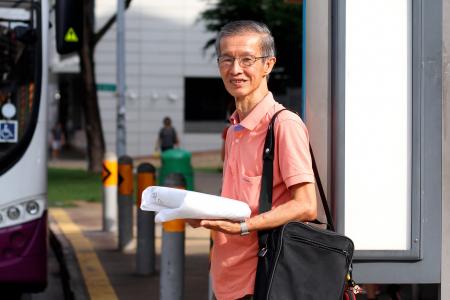Higher income for delivery riders and drivers as demand grows
Recently, two top performing Foodpanda riders were rewarded with an all-expenses-paid trip to watch the opening match at the recently concluded Euro 2016.
This just shows how badly the delivery service industry needs people.
And the demand is reflected in how much these drivers earn.
The food delivery service said some of its riders make up to $6,000 a month.
Its managing director, Ms Emma Heap,said rising demand for riders comes from an ongoing online revolution where many traditional industries are moving into the digital domain - such as commerce, taxis, and the food and beverage industry.
It had to increase its fleet of riders to cope with the demand and now works with more than 2,500 riders.
Launched in 2012, Foodpanda has seen up to 400 per cent increase in revenue last year.
It is not the only company with a huge demand for riders.
CHALLENGE
Other companies are also finding it challenging to make that last mile - when goods get to customers - efficient.
Zap Delivery, a delivery service, said it has been a challenge to get couriers as other companies are also hiring.
Online marketplace Qoo10's brand manager Jacob Yu said there has been a significant increase in delivery services recently.
He said: "Consumers are getting more e-commerce savvy, so there's demand for their products to be delivered to their doorsteps as soon as possible."
The firm has its own delivery company, Qexpress, which deploys an average of 200 to 300 delivery men a day from their two depots at Serangoon North and at the Singapore Press Holdings Print Centre.
Each delivery van delivers about 100 parcels a day.
Since Qexpress first started in 2010, there has been an almost 100 per cent growth every year up to last year.
Mr Yu told TNP that couriers in Qexpress are earning much more than before due to the increase in parcels delivered.
He said: "There is almost an 80 per cent increment in parcel delivery, therefore delivery man revenue increase as well."Zap Delivery's marketing manager Phylin Png said they have extended their network to non-traditional sources - students above 18 and retirees.
Ms Png said: "You don't need a vehicle to start. Anybody who needs an income or a supplementary income can join us."
UberEats, the new food delivery spin-off from Uber, has been seeing rising demand since its launch this May.
A spokesman said: "We are actively looking for new drivers to meet the phenomenal response we've received since introducing UberEats in Singapore."
Mr Muhammad Fazly, 29, joined UberEats full-time after his wife saw an advertisement.
He said the salary at UberEats is better than when he worked as a delivery rider at a fast food company.
He now earns about $1,500 a week. Heused to earn about $1,300 a month.
He said: "Uber is a good company to work for. We don't sit down and wait for orders.
"There's more freedom because we can ride around too look for orders, which makes it more efficient."
Full-time UberEats rider Seah Chia Hong, 29, said drivers can now pick and choose.
He said: "It's definitely easy to find another job if you quit.
"Today you quit Uber, tomorrow you can start working for Foodpanda or Deliveroo."
Uber is a good company to work for. We don't sit down and wait for orders. There's more freedom because we can ride around too look for orders, which makes it more efficient.
- Mr Muhammad Fazly, a full-time UberEats rider who used to deliver for a fast food company
He finds delivering a piece of cake

While most deliverymen use their motorcycles or cars, Mr Michael Ng, 63, makes his deliveries around Singapore via public transport.
He said he does not feel any competition between him and his younger peers who zip around in their vehicles.
Mr Ng said: "I travel by foot and public transport, they travel by their own vehicles.
"But that's because my items are lighter, while they usually have to deliver the heavier parcels.
"I don't have to worry about wasting time looking for parking space. I just go up to the house, deliver and I'm done."
In the face of the manpower crunch, retirees can be a possible source of manpower.
Zap Delivery's co-founder and chief executive officer Michael Tan said: "They can definitely add to the available manpower of Singapore and Zap Delivery.
"Some advantages they have are that they have all the time they want to select the jobs they want to fulfil, take on more or less jobs according to their schedules, as compared to part-timers who have lesser available hours to take up jobs from Zap Delivery."
Zap Delivery, launched in last year, is a service platform that provides both same-day delivery services for corporate users, and delivery services within two hours for individuals here.
It was the brainchild of founders Alexander Danilov and Michael Tan, both of whom had experiences with unreliable courier services.
Users can use the Zap! app, available on both Google Play and Apple, to book the nearest courier to deliver their documents or parcels, from a starting fee of $5 for documents, and $6 for parcels in the first 3km..
The fee is split between the courier and the company.
The courier receives 80 per cent while the company gets 20 per cent.
Mr Ng, who retired in 2006, decided to pick up ad hoc jobs as he was restless and did not want to sit around at home.
He says: "Depending on the number of packages I deliver, I can earn an average of $100 a week."
He chose to join Zap Delivery because he felt he was doing a service for people who need "urgent delivery services".
Armed with Google Maps on his smartphone and an old map of Singapore, Mr Ng dutifully does his deliveries be it rain or shine, three times a week, delivering an average of six packages a day.
EASY
While Mr Ng has been working as a courier since last month, he said he has not met any challenges so far.
The maximum weight for a package Mr Ng has delivered is 7kg. Packages are currently limited to 10kg for personal deliveries.
One of his most memorable experiences was delivering a birthday present to a party at Jurong West.
He said: "The woman was unable to attend the party, so I delivered it (to her friend) on her behalf.
"The friend was surprised when I knocked on the door."
Mr Ng even got a slice of birthday cake.
He considers his job as "his mission to make people's vision come true".
He said: "Every job has its own interests, but I do hope to have a chance to deliver cute things in the future."
FastFast app 'helps increase manpower'
Founder of alternative fashion clothing chain 77th street, Ms Elim Chew, has also ventured into the delivery service.
She started courier service FastFast last year with Mr Adrian Ng, founder of app development firm Codigo.
With FastFast, users can arrange for packages to be delivered at about $16 within 90 minutes.
Ms Chew told The New Paper she started FastFast to make lives easier.
She said: "Basically it is like the Uber for courier service, where there are hundreds of drivers ready to deliver your items instantly. At the same time, it offers additional income for people who need it.
"It will save your day, especially when you have urgent and important items to be delivered within a short time."
Ms Chew said companies in Singapore, especially start-ups and small- and medium-sized enterprises (SME), lack the logistic support and resources which FastFast can provide.
She said: "Our goal is to fill that gap and provide on-demand delivery services at affordable rates based on distance, any time and anywhere.
"It also helps to increase manpower by offering employment as well."
CHALLENGES
Ms Chew added that some of the challenges they face might be due to people still being more used to traditional courier services.
She said: "It would take some time for people to be receptive to the idea of using the FastFast app.
"I think there is a lot of potential for FastFast to grow especially with the high cost of living/business and when resources are tight."
Get The New Paper on your phone with the free TNP app. Download from the Apple App Store or Google Play Store now


